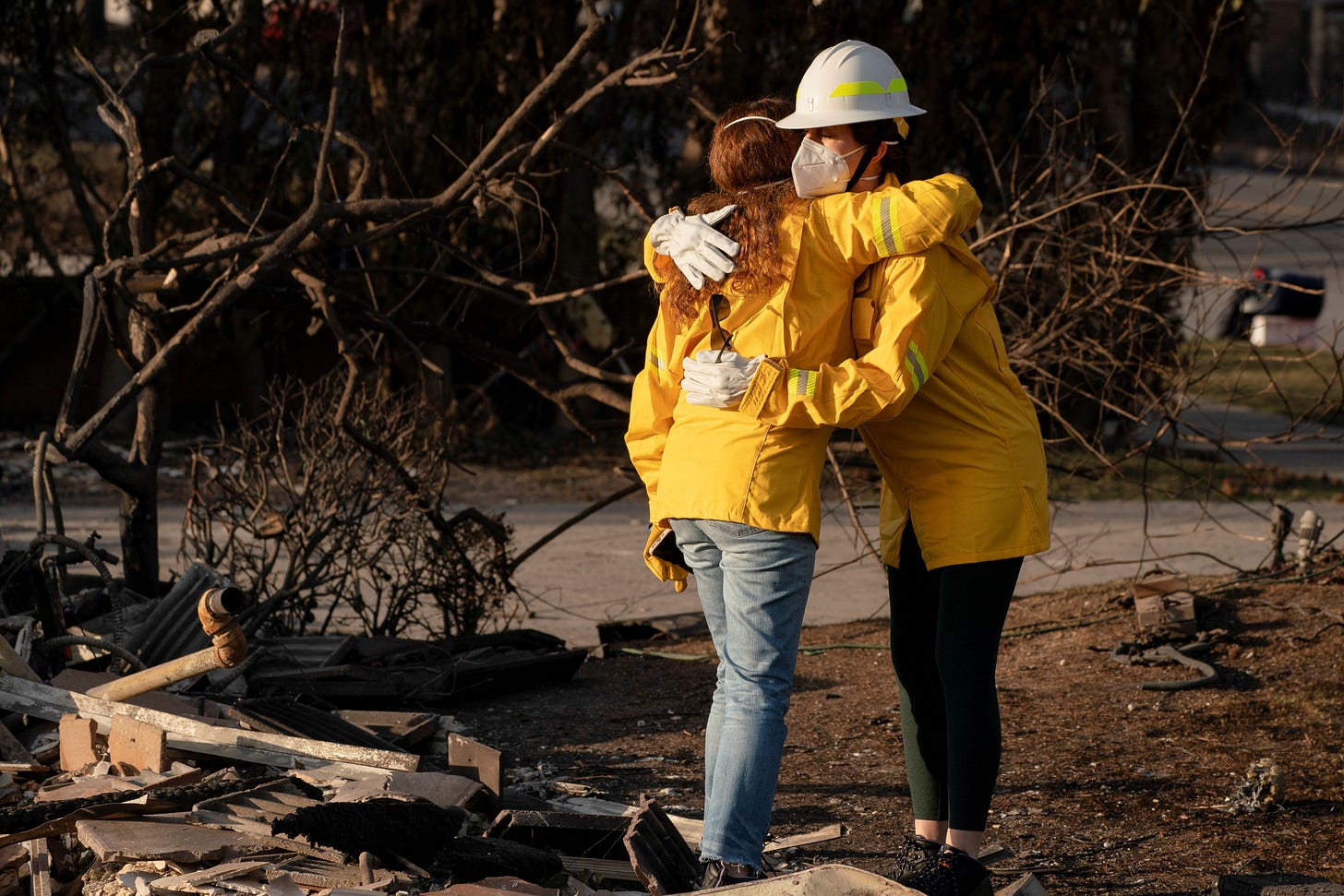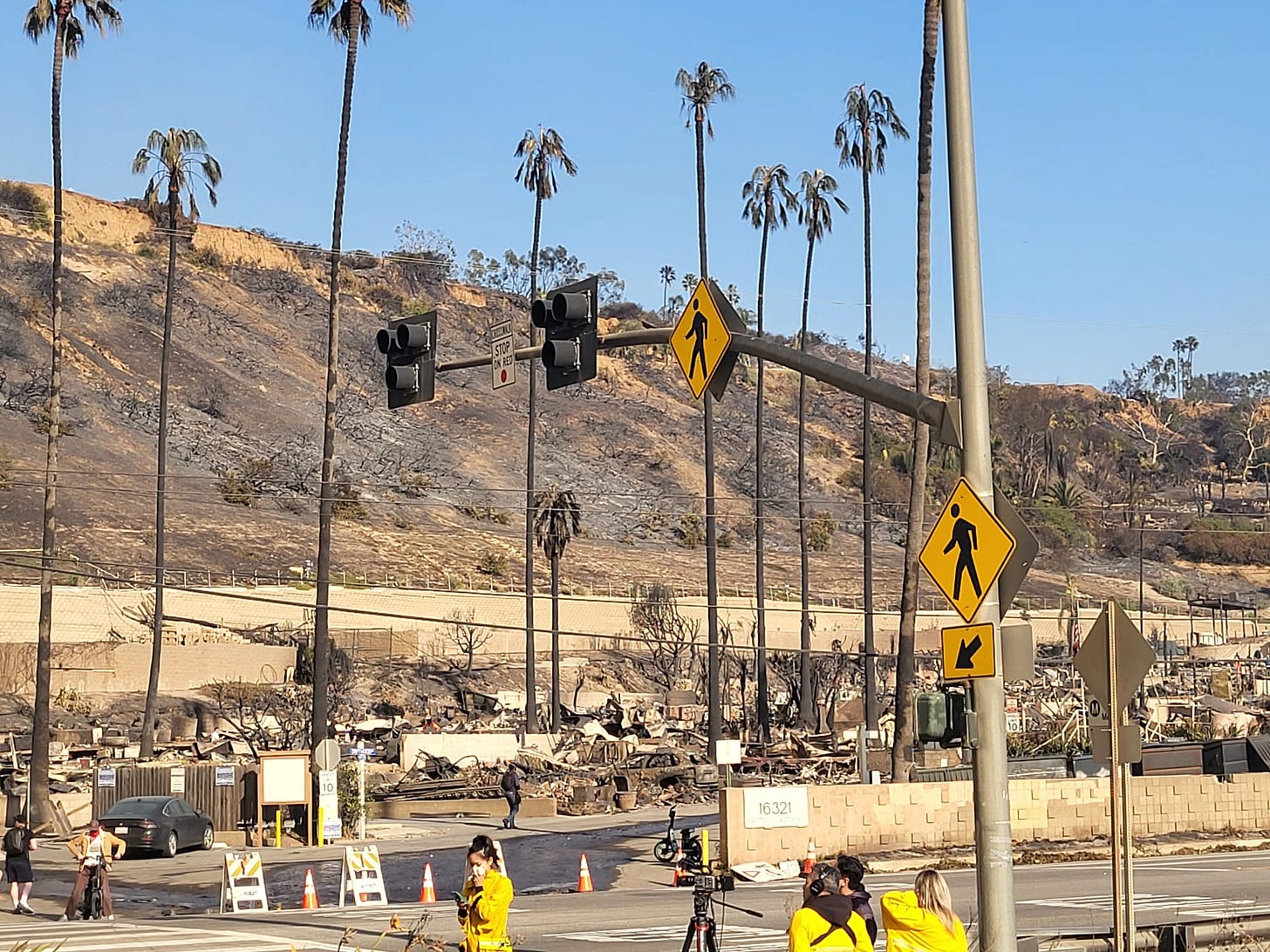The Quiet Heroism of My LA Neighbors
The acts of kindness I've witnessed here in Pacific Palisades are what hold a community together, even when everything else feels like it’s falling apart.

I first saw the smoke and fire climbing the hills of Pacific Palisades from my airplane as it made its descent to LAX from Toronto. The dark, menacing plumes were a stark contrast to the usual serene view of Los Angeles beaches and mountains. I found myself plunged into the heart of Los Angeles’ wildfire disaster. My condo, though still standing by the grace of God, remains within the evacuation zone. Like thousands of my neighbors, I have no idea when I will be allowed to return – or what I’ll find when I do.
Sylvia Phelps, a former resident, once remarked, “If you’re rich, you live in Beverly Hills. If you’re famous, you live in Malibu. If you’re lucky, you live in Pacific Palisades.” Famously immortalized in ‘Surfin’ U.S.A.’ by The Beach Boys, Pacific Palisades has always been a place of unparalleled beauty, where the ocean meets the mountains and the mountains touch the sky. I once believed I had found paradise here. Today, that paradise is cloaked in ash, uncertainty, and loss.
When the mandatory evacuation order came, I was just minutes away from my residence on the Pacific Coast Highway. My Uber was forced to turn back, leaving me to wonder if I would see my home again. Later, I saw dozens of abandoned cars near my condominium – evidence of residents fleeing on foot, clutching only what they could carry. When I managed to bike back to my property, it was miraculously still standing, though fires burned dangerously close. After pleading with officers – joined unexpectedly by a homeless man who advocated on my behalf – I was allowed to retrieve my car, which had two flat tires. Friends and even acquaintances immediately offered help, vehicles, and even places to stay, exemplifying the human spirit to support one another in crisis.

I have received unsolicited gift cards, offers of rooms, and even entire homes for short-term stays from friends and colleagues. One colleague's message exemplifies this generosity: “We have two empty bedrooms – one with a single bed, but we can add a futon, and the other with a double bed. Food is kosher and hence halal. Feel free to call me at home. We will also be out of town from this Friday till Tuesday morning and could even give you more room until late in the month. There will even be an extra car. Just let me know – we are happy to help and love kids.”
The generosity has been overwhelming, reminding me that in times of crisis, the human spirit can shine brightly.
What struck me most was the quiet heroism of neighbors who stayed back to defend properties and are now offering unwavering support to those affected. The aid response has been phenomenal. I moved away from the area temporarily to ease the burden on my kids and took them to see a movie. There, the theater staff was fundraising for fire victims before the screening began. The generosity has been overwhelming, reminding me that in times of crisis, the human spirit can shine brightly. Acts like these are what hold a community together, even when everything else feels like it’s falling apart.
Two close friends lost their homes entirely. One shared how he fled with nothing but his wallet, his pet bird, and a pair of jeans as flames engulfed his property. Watching through his security cameras, he saw firefighters valiantly battle the fire before being forced to retreat. His street now lies in ruins, unrecognizable.
A Stark Reminder
The scale of destruction is staggering: at least 24 people killed (I send my condolences to their families and friends), over 153,000 people displaced, more than 10,000 structures destroyed, over 40,000 acres burned, and untold livelihoods disrupted. Yet, amid this chaos, the community’s resilience has shone brightly. First responders, visibly exhausted and covered in ash, have fought tirelessly against the flames. Local businesses stepped up – restaurants offered free meals, rideshare companies provided free transportation, and grocery stores donated supplies.

But this disaster isn’t just about one community. It’s a stark reminder of the larger forces at play. Climate change has turned California into a tinderbox. Rising temperatures, prolonged droughts, and erratic weather patterns have created conditions where wildfires are not just frequent but catastrophic. As highlighted in recent analyses, emissions from the world’s largest fossil fuel companies have directly contributed to these conditions, with 37% of the cumulative area burned in the western US and Canada linked to their operations. These companies, despite knowing the consequences of their actions for decades, continue to prioritize profits over planetary survival.
California has taken some steps to hold these companies accountable. Legal actions aim to redirect their profits toward mitigating the climate crisis and addressing the damage. But the fight is far from over. As climate scholar Tzeporah Berman aptly noted, “Every barrel of oil, every cubic meter of gas, and every ton of coal burned brings us closer to environmental catastrophe.” Until we phase out fossil fuels and transition to renewable energy, disasters like these will only grow more frequent and severe.
Reflecting on this experience, I can’t help but think of other communities displaced by disaster and violence. The images of evacuees, uncertain of when or if they can return home, remind me of the far-worse plight of refugees across the globe –especially in Gaza, where displacement is not just temporary but often permanent. Unlike us, however, many of those fleeing war zones face dangers even in their escape, their lives further imperiled by systemic injustices. They're also often unable to return, their lives further imperiled by systemic injustices and continued, unimaginable violence. This contrast has been humbling and deeply moving.
Not ‘Just Rich People’
In the midst of this devastation, it’s disheartening to hear dismissive comments like, “They’re just rich people.” While Pacific Palisades is 81% white and known for its affluence, significant numbers of working-class residents live here – gardeners, housekeepers, teachers, and renters – many of whom lack insurance and resources to rebuild. Their struggle is mirrored in communities like Altadena, one of the first middle-class Black neighborhoods in California, which thrived despite redlining policies that prevented Black Americans from purchasing property in most areas of the state. Today, 60% of Altadena is non-white and predominantly working class, highlighting how such disasters disproportionately affect those with fewer resources, regardless of location. For these families, recovery will be an uphill battle.
As the flames subside, there are urgent steps we must take.


